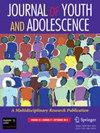The Relationship between Interparental Conflict and Depressive symptoms Spanning from Childhood to Youth: A Systematic Review and Meta-Analysis.
IF 3.6
1区 心理学
Q1 PSYCHOLOGY, DEVELOPMENTAL
引用次数: 0
Abstract
Previous studies have presented diverse perspectives and inconsistent findings regarding the relationship between interparental conflict and depressive symptoms. The current study aimed to clarify the overall strength of the association between interparental conflict and depressive symptoms and its influencing factors. By analyzing 89 retrieved studies (106 effect sizes, 64462 participants) through a random-effects mode. It was found that there was a significant positive correlation between interparental conflict and depressive symptoms, with a large effect size (r = 0.32, 95% CI [0.30, 0.35]). Additionally, measurement tools and reporter of parental conflict, sampling year, and individualism index significantly moderated this association. Specifically, the correlation between interparental conflict measured by Children's Perception of Interparental Conflict Scale and depressive symptoms is stronger than that measured by other scales. Compared with self-reported parental conflict, parental-reported parental conflict has a weaker correlation with depressive symptoms. The more recent the sampling year, the stronger the correlation, while the higher the individualism index, the weaker the correlation. This meta-analysis indicates that interparental conflict is a significant risk factor for depressive symptoms in children and adolescents. Over time, especially in countries with a lower individualism index, focusing on reducing interparental conflict could help decrease the incidence of depressive symptoms in children, adolescents and youth.父母间冲突与儿童期至青少年期抑郁症状的关系:系统回顾与元分析。
以往的研究对父母间冲突与抑郁症状之间的关系提出了不同的观点和不一致的发现。本研究旨在阐明父母间冲突与抑郁症状之间的整体关联强度及其影响因素。通过随机效应模式分析89项检索研究(106个效应大小,64462名参与者)。结果发现,父母间冲突与抑郁症状之间存在显著正相关,且效应量较大(r = 0.32, 95% CI[0.30, 0.35])。此外,测量工具和报告者的父母冲突、采样年份和个人主义指数显著调节了这种关联。具体而言,“儿童父母间冲突感知量表”测量的父母间冲突与抑郁症状的相关性强于其他量表。与自我报告的父母冲突相比,父母报告的父母冲突与抑郁症状的相关性较弱。抽样年份越近,相关性越强,而个人主义指数越高,相关性越弱。本荟萃分析表明,父母之间的冲突是儿童和青少年抑郁症状的重要危险因素。随着时间的推移,特别是在个人主义指数较低的国家,注重减少父母之间的冲突可能有助于减少儿童、青少年和青年中抑郁症状的发生率。
本文章由计算机程序翻译,如有差异,请以英文原文为准。
求助全文
约1分钟内获得全文
求助全文
来源期刊

Journal of Youth and Adolescence
PSYCHOLOGY, DEVELOPMENTAL-
CiteScore
8.20
自引率
6.10%
发文量
155
期刊介绍:
Journal of Youth and Adolescence provides a single, high-level medium of communication for psychologists, psychiatrists, biologists, criminologists, educators, and researchers in many other allied disciplines who address the subject of youth and adolescence. The journal publishes quantitative analyses, theoretical papers, and comprehensive review articles. The journal especially welcomes empirically rigorous papers that take policy implications seriously. Research need not have been designed to address policy needs, but manuscripts must address implications for the manner society formally (e.g., through laws, policies or regulations) or informally (e.g., through parents, peers, and social institutions) responds to the period of youth and adolescence.
 求助内容:
求助内容: 应助结果提醒方式:
应助结果提醒方式:


